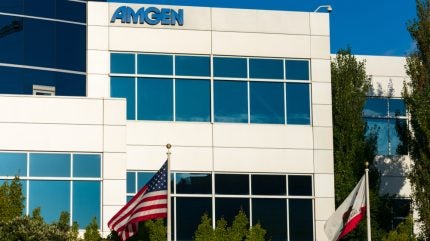
Amgen has reported that its once-monthly dosing regimen and manufacturing capabilities will be key to entering the obesity market.
Presenting at the JP Morgan Healthcare Conference 2025 on 13 January, Amgen’s CEO Robert Bradway asked potential investors not to think of MariTide (maridebart cafraglutide) as the third main weight loss candidate on the market.

Discover B2B Marketing That Performs
Combine business intelligence and editorial excellence to reach engaged professionals across 36 leading media platforms.
“I hope we will be the world’s first long-acting therapy in the treatment of obesity and obesity-related conditions. It’s been an objective of the field for many years, to have a long-acting treatment option for type 2 diabetics (T2D),” Bradway explains.
“We feel the prospect of being able to offer patients a monthly or less frequent alternative is going to be very attractive in patients with T2D, in patients with obesity and overweight and in patients with various other diseases that we intend to study in the Phase III clinical programme for this medicine.”
Following the JP Morgan presentation, Amgen’s stock saw a slight increase of 3.03%, from a market close of $262.23 on 10 January to a market close of $270.19 on 13 January. The California-based biopharma has a market cap of $145.42bn.
In November 2024, Amgen presented Phase II data from its obesity candidate MariTide, a bispecific glucagon-like peptide 1 (GLP-1) receptor agonist and glucose-dependent insulinotropic polypeptide receptor (GIPR) antagonist. If approved, it could boast a once-monthly dosing regimen, which is far more attractive than the once-weekly dosing of its main rivals Novo Nordisk’s Wegovy and Eli Lilly’s Zepbound.

US Tariffs are shifting - will you react or anticipate?
Don’t let policy changes catch you off guard. Stay proactive with real-time data and expert analysis.
By GlobalDataThe Phase II trial (NCT05669599) investigated the candidate in patients living with obesity or overweight without T2D where MariTide demonstrated up to 20% average weight loss at week 52 without a weight loss plateau.
The trial also investigated the drug in patients with obesity or overweight and T2D, who typically lose less weight on GLP-1 therapies, achieved up to 17% average weight loss, also without a weight loss plateau, and lowered their average haemoglobin A1C (HbA1c) by up to 2.2 percentage points at week 52.
Despite what Amgen said was “positive data”, shareholders were less convinced, and shares dropped by 4.8% after the data was released.
Before the Phase II data was announced, the company suffered another share drop after concerns related to bone mineral density (BMD) loss with MariTide were raised by an analyst prompting a $12bn market wipe. Amgen attempted to put investors’ minds at ease, claiming that the company has not seen an association between the administration of MariTide and BMD changes. In the Phase II data update, the company reiterated it did not have any BMD concerns.
The company has announced Phase III trials of MariTide which it hopes to launch in H1 and H2 2025.
Another key improvement needed in the weight loss space is an expansion of manufacturing capabilities after both Novo Nordisk and Eli Lilly have struggled to keep up with the rising demand for these therapies. Last month, Amgen said it would invest $1.02bn to expand the manufacturing capability of its facility in Holly Springs, North Carolina.
Bradway added: “This is a field that has been challenged by supply, and supply is something that Amgen has demonstrated an ability to maintain across our portfolio and is something that we feel we are ready to do in obesity as well.”
Other pipeline candidates discussed at JP Morgan 2025
The biopharma CEO also discussed other candidates in Amgen’s pipeline including Olpasiren and Blinctyro (blinatumomab).
Olpasiren is a small interfering RNA (siRNA) therapy which acts by reducing lipoprotein (a) (Lp(a)) levels and low-density lipoprotein cholesterol (LDL-C) levels in patients to reduce the risk of cardiovascular events. The therapy is in Phase III studies.
Blinctyro is a monoclonal antibody that targets the CD19 antigen present in B cells. It is approved in Philadelphia chromosome-negative relapsed or refractory acute lymphoblastic leukaemia. The therapy is advancing in other therapy areas after Amgen revealed promising initial data in refractory rheumatoid arthritis. The therapy is in a Phase II study in systemic lupus erythematosus (SLE).
The California-based company, best known for biosimilars, is running Phase III trials of biosimilars of Keytruda, Opdivo and Ocrevus. Amgen’s biosimilars have generated $10bn of cumulative sales.
Before the 13 January presentation at JP Morgan 2025, Amgen pledged $10m in aid to Los Angeles following the devastating wildfires that have wiped out 40,000 acres of land and killed at least 24.
Elsewhere at the healthcare conference, NVIDIA partnered with IQVIA, Illumina and Mayo Clinic, and GSK announced a $1.15bn deal to acquire IDRx.




